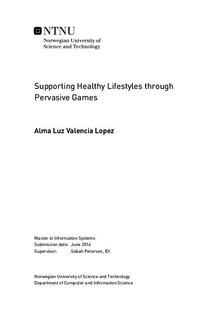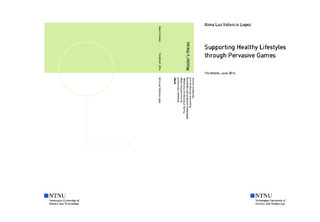| dc.description.abstract | A sedentary lifestyle has increased the amount of people with obesity and diabetes. Obesity has become an urgent matter in recent years since the number of children with this condition has increased in alarming numbers.
This thesis addresses this issue throughout the use of pervasive games to support healthier lifestyles. A healthy lifestyle refers to the balance between physical activity and food intake. Nowadays popular health and tracking apps have not integrated this relationship as they are mainly focus on either exercise or nutrition.
The latter focus only considering the amount of calories or the type of food the user consumes. But they don't contemplate the association between mood and food. The former focus is mostly used to track the energy expenditure of the user's physical activity.
Thus, this thesis supports healthy lifestyles using a prototype of a mobile application. To do so, requirements have been gathered from young people through a workshop and a questionnaire. Then, the requirements were compared against the literature to define all the relevant features. Finally, a prototype has been designed. Such support is provided in three main areas: Exercise, Nutrition and Mood. Feedback is given about the user's exercise and by interacting with nutrition and mood through a virtual character that can feed and exercise. All the food contained in the application shows its nutritional value, number of calories and it is related to a mood score. The higher the mood score is, the happier the virtual character will be. And the other way around: if the score is low, the character will become sad.
The outcome of this project has been evaluated by students from the Trondheim International School and was presented to people from the IT industry. The diversity of both groups gave a different perspective of the us and areas of application of the final prototype.
The evaluation results have shown that the use of a virtual character can help the user to understand and realize the impact of food and its relationship with the mood. The virtual character creates a cognitive conflict among children because they are encourage to change their idea about the relationship between junk food and happiness. The cognitive conflict can help to destabilize misconceptions and create new and solid knowledge. | |

